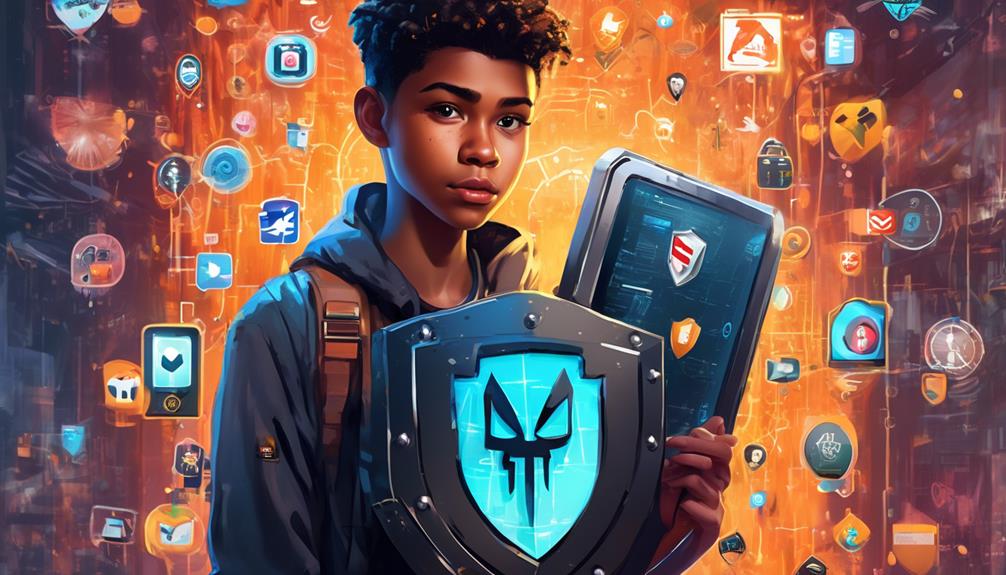As cyber attacks increase and 95% of breaches result from human error, teens need access to top cybersecurity study aids. These resources provide knowledge and skills for navigating the digital landscape safely and responsibly. The world of cybersecurity study aids for teens is vast and always evolving, offering interactive platforms and informative guides. Discovering effective study aids can significantly impact teens' understanding of cybersecurity and their ability to protect themselves and others online.
US Cyber Challenges (USCC) Cyber Quests

The US Cyber Challenges (USCC) Cyber Quests offer engaging online competitions that test knowledge and skills in information security. High schoolers can greatly benefit from participating, as the quests provide an interactive learning experience through artifacts analysis and quiz questions. Furthermore, these competitions are part of the National Initiative for Cybersecurity Careers and Studies (NICCS), designed to identify and nurture the next generation of cybersecurity professionals. This presents high schoolers with an invaluable opportunity to explore and excel in a field that is intellectually stimulating and increasingly important in today's digital world.
K-12 Computer Science Framework
In partnership with various organizations, the K-12 Computer Science Framework offers essential guidance and resources for parents and educators. It supports teaching computer science to students at different grade levels, emphasizing foundational knowledge. The framework covers a wide range of topics, including security, to prepare students for the digital future. It provides structured guidance to ensure a well-rounded computer science education. Additionally, it assists high school educators in delivering advanced computer science courses, equipping students with skills for cybersecurity careers. Emphasizing early development of computer science skills, the framework plays a crucial role in preparing students for digital challenges.
StopBullying.gov

StopBullying.gov, created by the FBI, teaches kids to recognize and confront bullying, promoting online safety. The site provides training, state laws, and school materials to address bullying immediately. It raises awareness, protects children, and promotes a safer online environment. StopBullying.gov empowers parents, educators, and children with information and tools to effectively prevent bullying. Integrating these resources helps young individuals navigate the online world confidently. In the context of cybersecurity study aids for teens, StopBullying.gov is essential for promoting a secure online environment. It offers insights into the social aspects of cybersecurity, complementing computer science. By fostering a supportive online community, it supports the goal of creating a positive and safe digital space.
Public Broadcasting Service (PBS)
Public Broadcasting Service (PBS) provides educational and informative content, including documentaries, children's shows, news, and cultural programs. As a non-profit organization, PBS offers high-quality, widely used educational content. It is available for free over the airwaves, cable, and satellite, reaching a broad audience. Additionally, PBS provides online streaming services, making its content accessible via the internet. This allows teens to access educational resources and informative content at their convenience. Furthermore, PBS covers a wide array of topics relevant to teens, including cybersecurity, through documentaries and news segments. Teens can also find supplementary information on cybersecurity through blogs and articles covering PBS programming. By leveraging PBS's educational resources and internet accessibility, teens can enhance their understanding of cybersecurity and develop important skills to navigate the digital world safely.
FBIs Safe Online Surfing

PBS is dedicated to providing teens with educational resources, including cybersecurity. A valuable platform for this is the FBI's Safe Online Surfing website. It offers interactive games and resources for children of all ages, making learning about online safety engaging and accessible. This website ensures internet safety and provides teacher resources, all developed by the FBI. Through this platform, students can learn about cybersecurity and safe online practices in a fun and interactive way, empowering them to navigate the digital world securely. It is beneficial for children as well as a great resource for parents and educators. The FBI's Safe Online Surfing effectively teaches kids about cyber threats and promotes responsible internet use. It is a valuable resource in today's online world.
Safeguarding Your Devices and Reporting Resources
In order to ensure online security, regularly update devices with the latest security features and patches. This helps protect against known vulnerabilities exploited by cybercriminals. Additionally, use strong passwords, biometrics, or multi-factor authentication for added security. Installing reputable antivirus and anti-malware software is crucial for preventing and detecting cyber threats. Familiarize yourself with reporting resources such as the Internet Crime Complaint Center and State Attorney General's Office. These are valuable avenues for filing complaints if you become a victim of online crime. Being cautious of suspicious links, emails, and downloads is also essential. Reporting potential cyber threats to the appropriate authorities helps combat cybercrime and protect others from falling victim to similar threats.
Frequently Asked Questions
What Is the Best Way to Study Cyber Security?
To study cybersecurity effectively, engage in interactive tutorials, practice labs, and online courses. These resources provide hands-on learning experiences and certifications, preparing individuals for real-world cyber challenges and empowering them with practical skills.
How to Learn Cybersecurity in High School?
During high school, students can gain cybersecurity knowledge through practical experiences, relevant classes, and mentor guidance. Introducing cybersecurity into the curriculum can ignite interest in cybersecurity careers and provide vital skills for the future.
How Do I Get My Child Interested in Cyber Security?
To pique your child's interest in cybersecurity, involve them in enjoyable and hands-on activities. Introduce games, puzzles, and stories with cybersecurity themes. Emphasize the significance of protecting personal information and privacy online. Motivate their involvement in cybersecurity competitions.
Why Do High School Students Need to Study Cybersecurity?
High school students must study cybersecurity as it is crucial for protecting against cyber threats and expanding career options. It provides essential skills and promotes informed decision-making online.
Conclusion
In summary, these top cybersecurity study aids for teens offer vital knowledge and practical skills for navigating the digital world safely. Specifically, the K-12 Computer Science Framework provides a comprehensive curriculum for teaching teens about computer science and cybersecurity. This prepares them for future career opportunities in the field. By using these study aids, teens can improve their understanding of cybersecurity and develop the essential skills to protect themselves and others online.



